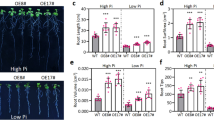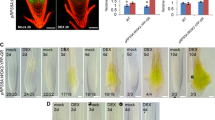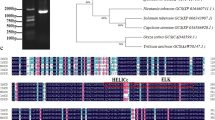Abstract
E4, a ubiquitin (Ub) chain assembly factor and post-translational modification protein, plays a key role in the regulation of multiple cellular functions in plants during biotic or abiotic stress. We have more recently reported that E4 factor AtUAP1 is a negative regulator of the osmotic stress response and enhances the multi-Ub chain assembly of E3 ligase Arabidopsis thaliana RING Zinc Finger 1 (AtRZF1). To further investigate the function of other E4 Ub factors in osmotic stress, we isolated AtUAP2, an AtUAP1 homolog, which interacted with AtRZF1, using pull-down assay and bimolecular fluorescence complementation analysis. AtUAP2, a Ub-associated motif-containing protein, interacts with oligo-Ub5, -Ub6, and -Ub7 chains. The yeast functional complementation experiment revealed that AtUAP2 functions as an E4 Ub factor. In addition, AtUAP2 is localized in the cytoplasm, different from AtUAP1. The activity of AtUAP2 was relatively strongly induced in the leaf tissue of AtUAP2 promoter-β-glucuronidase transgenic plants by abscisic acid, dehydration, and oxidative stress. atuap2 RNAi lines were more insensitive to osmotic stress condition than wild-type during the early growth of seedlings, whereas the AtUAP2-overexpressing line exhibited relatively more sensitive responses. Analyses of molecular and physiological experiments showed that AtUAP2 could negatively mediate the osmotic stress-induced signaling. Genetic studies showed that AtRZF1 mutation could suppress the dehydration-induced sensitive phenotype of the AtUAP2-overexpressing line, suggesting that AtRZF1 acts genetically downstream of AtUAP2 during osmotic stress. Taken together, our findings show that the AtRZF1−AtUAP2 complex may play important roles in the ubiquitination pathway, which controls the osmotic stress response in Arabidopsis.
Key message
AtUAP2 has E4 ubiquitin activity, as judged by its assembly of oligo-ubiquitin chains. Genetically, AtUAP2 plays an intermediary role in regulating the osmotic stress response through the AtRZF1-dependent pathway.








Similar content being viewed by others
References
An JP, Liu X, Song LQ, You CX, Wang XF, Hao YJ (2017) Apple RING finger E3 ubiquitin ligase MdMIEL1 negatively regulates salt and oxidative stresses tolerance. J Plant Biol 60:137–145. https://doi.org/10.1007/s12374-016-0457-x
Azevedo C, Santos-Rosa MJ, Shirasu K (2001) The U-box protein family in plants. Trends Plant Sci 6:354–358. https://doi.org/10.1016/S1360-1385(01)01960-4
Bates LS, Waldren RP, Teare ID (1973) Rapid determination of free proline for water-stress studies. Plant Soil 39:205–207. https://doi.org/10.1007/BF00018060
Bertolaet BL, Clarke DJ, Wolff M, Watson MH, Henze M, Divita G, Reed SI (2001) UBA domains of DNA damage-inducible proteins interact with ubiquitin. Nat Struct Mol Biol 8:417–422. https://doi.org/10.1038/87575
Callis J, Carpenter T, Sun CW, Vierstra RD (1995) Structure and evolution of genes encoding polyubiquitin and ubiquitin-like proteins in Arabidopsis thaliana Ecotype Columbia. Genetics 139:921–939. https://doi.org/10.1093/genetics/139.2.921
Chen L, Shinde U, Ortolan TG, Madura K (2001) Ubiquitin-associated (UBA) domains in Rad23 bind ubiquitin and promote inhibition of multi-ubiquitin chain assembly. EMBO Rep 2:933–938. https://doi.org/10.1093/embo-reports/kve203
Conforti L, Tarlton A, Mack TGA, Mi W, Buckmaster EA, Wagner D, Perry VH, Coleman MP (2000) A Ufd2/D4Cole1e chimeric protein and overexpression of Rbp7 in the slow Wallerian degeneration (Wlds) mouse. Proc Natl Acad Sci U S A 97:11377–11382. https://doi.org/10.1073/pnas.97.21.11377
Dong CH, Agarwal M, Zhang Y, **e Q, Zhu JK (2006) The negative regulator of plant cold responses, HOS1, is a RING E3 ligase that mediates the ubiquitination and degradation of ICE1. Proc Natl Acad Sci U S A 103:8281–8286. https://doi.org/10.1073/pnas.0602874103
Dreher K, Callis J (2007) Ubiquitin, hormones and biotic stress in plants. Ann Bot 99:787–822. https://doi.org/10.1093/aob/mcl255
Earley KW, Haag JR, Pontes O, Opper K, Juehne T, Song K, Pikaard CS (2006) Gateway-compatible vectors for plant functional genomics and proteomics. Plant J 45:616–629. https://doi.org/10.1111/j.1365-313X.2005.02617.x
French ME, Koehler CF, Hunter T (2021) Emerging functions of branched ubiquitin chains. Cell Discov 7:6. https://doi.org/10.1038/s41421-020-00237-y
Funakoshi M, Sasaki T, Nishimoto T, Kobayashi H (2002) Budding yeast Dsk2p is a polyubiquitin-binding protein that can interact with the proteasome. Proc Natl Acad Sci U S A 99:745–750. https://doi.org/10.1073/pnas.012585199
Gietz RD, Schiestl RH (2007) High-efficiency yeast transformation using the LiAc/SS carrier DNA/PEG method. Nat Protoc 2:31–34. https://doi.org/10.1038/nprot.2007.13
Han G, Qiao Z, Li Y, Yang Z, Wang C, Zhang Y, Liu L, Wang B (2022) RING zinc finger proteins in plant abiotic stress tolerance. Front Plant Sci 13:877011. https://doi.org/10.3389/fpls.2022.877011
Hofmann K, Falquet L (2001) A ubiquitin-interacting motif conserved in components of the proteasomal and lysosomal protein degradation systems. Trends Biochem Sci 26:347–350. https://doi.org/10.1016/S0968-0004(01)01835-7
Hoppe T (2005) Multiubiquitylation by E4 enzymes: ‘one size’ doesn’t fit all. Trends Biochem Sci 30:183–187. https://doi.org/10.1016/j.tibs.2005.02.004
Huang D, Wu W, Abrams SR, Cutler AJ (2008) The relationship of drought-related gene expression in Arabidopsis thaliana to hormonal and environmental factors. J Exp Bot 59:2991–3007. https://doi.org/10.1093/jxb/ern155
Huang Y, Minaker S, Roth C, Huan S, Hieter P, Lipka V, Wiermer M, Li X (2014) An E4 ligase facilitates polyubiquitination of plant immune receptor resistance proteins in Arabidopsis. Plant Cell 26:485–496. https://doi.org/10.1105/tpc.113.119057
Jefferson RA, Kavanagh TA, Bevan MW (1987) GUS fusions: beta-glucuronidase as a sensitive and versatile gene fusion marker in higher plants. EMBO J 6:3901–3907. https://doi.org/10.1002/j.1460-2075.1987.tb02730.x
Johnson ES, Ma PCM, Ota IM, Varshavsky A (1995) A proteolytic pathway that recognizes ubiquitin as a degradation signal. J Biol Chem 270:17442–17456. https://doi.org/10.1074/jbc.270.29.17442
Ju HW, Min JH, Chung MS, Kim CS (2013) The atrzf1 mutation of the novel RING-type E3 ubiquitin ligase increases proline contents and enhances drought tolerance in Arabidopsis. Plant Sci 203–204:1–7. https://doi.org/10.1016/j.plantsci.2012.12.007
Karimi M, Inzé D, Depicker A (2002) GATEWAY™ vectors for Agrobacterium-mediated plant transformation. Trends Plant Sci 7:193–195. https://doi.org/10.1016/S1360-1385(02)02251-3
Kim AR, Min JH, Lee KH, Kim CS (2017) PCA22 acts as a suppressor of atrzf1 to mediate proline accumulation in response to abiotic stress in Arabidopsis. J Exp Bot 68:1797–1809. https://doi.org/10.1093/jxb/erx069
Koegl M, Hoppe T, Schlenker S, Ulrich HD, Mayer TU, Jentsch S (1999) A novel ubiquitination factor, E4, is involved in multiubiquitin chain assembly. Cell 96:635–644. https://doi.org/10.1016/S0092-8674(00)80574-7
Lambertson D, Chen L, Madura K (1999) Pleiotropic defects caused by loss of the proteasome-interacting factors Rad23 and Rpn10 of Saccharomyces cerevisiae. Genetics 153:69–79. https://doi.org/10.1093/genetics/153.1.69
Lyzenga WJ, Stone SL (2012) Abiotic stress tolerance mediated by protein ubiquitination. J Exp Bot 63:599–616. https://doi.org/10.1093/jxb/err310
Min JH, Park CR, Chung JS, Kim CS (2021) Arabidopsis thaliana ubiquitin-associated protein 1 (AtUAP1) interacts with redundant RING zinc finger 1 (AtRZF1) to negatively regulate dehydration response. Plant Cell Physiol 62:1044–1057. https://doi.org/10.1093/pcp/pcab082
Miricescu A, Goslin K, Graciet E (2018) Ubiquitylation in plants: signaling hub for the integration of environmental signals. J Exp Bot 69:4511–4527. https://doi.org/10.1093/jxb/ery165
Murashige T, Skoog F (1962) A revised medium for rapid growth and bioassays with tobacco tissue cultures. Physiol Plant 15:473–497. https://doi.org/10.1111/j.1399-3054.1962.tb08052.x
Nakagawa T, Kurose T, Hino T, Tanaka K, Kawamukai M, Niwa Y, Toyooka K, Matsuoka K, **bo T, Kimura T (2007) Development of series of gateway binary vectors, pGWBs, for realizing efficient construction of fusion genes for plant transformation. J Biosci Bioeng 104:34–41. https://doi.org/10.1263/jbb.104.34
Ning Y, Jantasuriyarat C, Zhao Q, Zhang H, Chen S, Liu J, Liu L, Tang S, Park CH, Wang X, Liu X, Dai L, **e Q, Wang GL (2011) The SINA E3 ligase OsDIS1 negatively regulates drought response in rice. Plant Physiol 157:242–255. https://doi.org/10.1104/pp.111.180893
Ortolan TG, Tongaonkar P, Lambertson D, Chen L, Schauber C, Madura K (2000) The DNA repair protein Rad23 is a negative regulator of multi-ubiquitin chain assembly. Nat Cell Biol 2:601–608. https://doi.org/10.1038/35023547
Park SH, Chung MS, Lee S, Lee KH, Kim CS (2017) Loss of ribosomal protein L24A (RPL24A) suppresses proline accumulation of Arabidopsis thaliana ring zinc finger 1 (atrzf1) mutant in response to osmotic stress. Biochem Biophys Res Commun 494:499–503. https://doi.org/10.1016/j.bbrc.2017.10.092
Ponting CP (2000) Proteins of the endoplasmic-reticulum-associated degradation pathway: domain detection and function prediction. Biochem J 351:527–535. https://doi.org/10.1042/bj3510527
Pukatzki S, Tordilla N, Franke J, Kessin RH (1998) A novel component involved in ubiquitination is required for development of Dictyostelium Discoideum. J Biol Chem 273:24131–24138. https://doi.org/10.1074/jbc.273.37.24131
Qin F, Sakuma Y, Tran LSP, Maruyama K, Kidokoro S, Fujita Y, Fujita M, Umezawa T, Sawano Y, Miyazono K, Tanokura M, Shinozaki K, Yamaguchi-Shinozaki K (2008) Arabidopsis DREB2A-interacting proteins function as RING E3 ligases and negatively regulate plant drought stress-responsive gene expression. Plant Cell 20:1693–1707. https://doi.org/10.1105/tpc.107.057380
Romero-Barrios N, Vert G (2018) Proteasome-independent functions of lysine-63 polyubiquitination in plants. New Phytol 217:995–1011. https://doi.org/10.1111/nph.14915
Rotem S, Katz C, Benyamini H, Lebendiker M, Veprintsev D, Rüdiger S, Danieli T, Friedler A (2008) The structure and interactions of the proline-rich domain of ASPP2. J Biol Chem 283:18990–18999. https://doi.org/10.1074/jbc.M708717200
Sadanandom A, Bailey M, Ewan R, Lee J, Nelis S (2012) The ubiquitin-proteasome system: central modifier of plant signaling. New Phytol 196:13–28. https://doi.org/10.1111/j.1469-8137.2012.04266.x
Schultz TF, Quatrano RS (1997) Characterization and expression of a rice RAD23 gene. Plant Mol Biol 34:557–562. https://doi.org/10.1023/a:1005870227632
Sharma B, Joshl D, Yadav PK, Gupta AK, Bhatt TK (2016) Role of ubiquitin-mediated degradation system in plant biology. Front Plant Sci 7:806. https://doi.org/10.3389/fpls.2016.00806
Shin DJ, Min JH, Van Nguyen T, Kim YM, Kim CS (2019) Loss of Arabidopsis Halotolerance 2-like (AHL), a 3′-phosphoadenosine-5′-phosphate phosphatase, suppresses insensitive response of Arabidopsis thaliana ring zinc finger 1 (atrzf1) mutant to abiotic stress. Plant Mol Biol 99:363–377. https://doi.org/10.1007/s11103-019-00822-0
Skelly MJ, Furniss JJ, Grey H, Wong KW, Spoel SH (2019) Dynamic ubiquitination determines transcriptional activity of plant immune coactivator NPR1. eLife 8:e47005. https://doi.org/10.7554/eLife.47005
Statements & Declarations
Su V, Lau AF (2009) Ubiquitin-like and ubiquitin-associated domain proteins: significance in proteasomal degradation. Cell Mol Life Sci 66:2819–2833. https://doi.org/10.1007/s00018-009-0048-9
Swatek KN, Usher JL, Kueck AF, Gladkova C, Mevissen TET, Pruneda JN, Skern T, Komander D (2019) Insights into ubiquitin chain architecture using Ub-clip**. Nature 572:533–537. https://doi.org/10.1038/s41586-019-1482-y
Trujillo M (2018) News from the PUB: plant U-box type E3 ubiquitin ligases. J Exp Bot 69:371–384. https://doi.org/10.1093/jxb/erx411
Van Nguyen T, Park CR, Lee KH, Lee S, Kim CS (2021) BES1/BZR1 homolog 3 cooperates with E3 ligase AtRZF1 to regulate osmotic stress and brassinosteroid responses in Arabidopsis. J Exp Bot 72:636–653. https://doi.org/10.1093/jxb/eraa458
Wagner U, Edwards R, Dixon DP, Mauch F (2002) Probing the diversity of the Arabidopsis glutathione S-transferase gene family. Plant Mol Biol 49:515–532. https://doi.org/10.1023/a:1015557300450
Walter M, Chaban C, Schütze K, Batistic O, Weckermann K, Näke C, Blazevic D, Grefen C, Schumacher K, Oecking C, Harter K, Kudla J (2004) Visualization of protein interactions in living plant cells using bimolecular fluorescence complementation. Plant J 40:428–438. https://doi.org/10.1111/j.1365-313X.2004.02219.x
Wilkinson CRM, Seeger M, Hartmann-Petersen R, Stone M, Wallace M, Semple C, Gordon C (2001) Proteins containing the UBA domain are able to bind to multi-ubiquitin chains. Nat Cell Biol 3:939–943. https://doi.org/10.1038/ncb1001-939
Yang N, Zhang Y, Chen L, Wang W, Liu R, Gao R, Zhou Y, Li H (2021) G protein and PLDδ are involved in JA to regulate osmotic stress responses in Arabidopsis thaliana. Biochem Biophys Repo 26:100952. https://doi.org/10.1016/j.bbrep.2021.100952
You Q, Zhai K, Yang D, Yang W, Wu J, Liu J, Pan W, Wang J, Zhu X, Jian Y, Liu J, Zhang Y, Deng Y, Li Q, Lou Y, **e Q, He Z (2016) An E3 ubiquitin ligase-BAG protein module controls plant innate immunity and broad-spectrum disease resistance. Cell Host Microbe 20:758–769. https://doi.org/10.1016/j.chom.2016.10.023
Zhang X, Garreton V, Chua NH (2005) The AIP2 E3 ligase acts as a novel negative regulator of ABA signaling by promoting ABI3 degradation. Genes Dev 19:1532–1543. https://doi.org/10.1101/gad.1318705
Funding
This work was supported by a National Research Foundation (NRF) grant funded by the Korean government (Ministry of Science and ICT) (2021R1A2C1009748); and the New Breeding Technologies Development Program of the Rural Development Administration (Republic of Korea) (Grant number PJ01653303).
Author information
Authors and Affiliations
Contributions
Cho-Rong Park, Ji-Hee Min, Ying Gong, and Cheol Soo Kim designed the study and interpreted the study results. Hyunkyu Sang performed the yeast functional complement test. Kyeong-Hwan Lee provided technical assistance with GFP analysis. Cho-Rong Park, Ji-Hee Min, and Ying Gong interpreted and analyzed the experimental results. Cho-Rong Park, Ji-Hee Min, and Cheol Soo Kim wrote the manuscript. All authors read and approved the final manuscript.
Corresponding author
Ethics declarations
Competing interests
The authors have no relevant financial or non-financial interests to disclose.
Additional information
Publisher’s Note
Springer Nature remains neutral with regard to jurisdictional claims in published maps and institutional affiliations.
Electronic supplementary material
Below is the link to the electronic supplementary material.
Rights and permissions
Springer Nature or its licensor (e.g. a society or other partner) holds exclusive rights to this article under a publishing agreement with the author(s) or other rightsholder(s); author self-archiving of the accepted manuscript version of this article is solely governed by the terms of such publishing agreement and applicable law.
About this article
Cite this article
Park, CR., Min, JH., Gong, Y. et al. Arabidopsis thaliana ubiquitin-associated protein 2 (AtUAP2) functions as an E4 ubiquitin factor and negatively modulates dehydration stress response. Plant Mol Biol 114, 13 (2024). https://doi.org/10.1007/s11103-024-01419-y
Received:
Accepted:
Published:
DOI: https://doi.org/10.1007/s11103-024-01419-y




